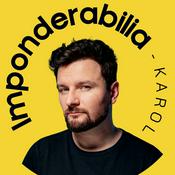53 odcinków
- In this episode, Margaret and Preston cover one of their most-requested clinical topics: diagnosing and treating Obsessive Compulsive Disorder, or OCD. Along the way, we review popular TikToks about OCD, including one Margaret made, and offer evidence-based approaches to treating OCD, along with a message of hope for anyone struggling with it.
Clinical guidelines Mentioned by Margaret
International OCD Foundation Treatment Guidelines (APA has an older one, not recently updated)
https://iocdf.org/ocd-treatment-guide/
AACAP Practice Parameter
https://www.jaacap.org/article/S0890-8567(11)00882-3/fulltext
AACAP Recommended Guideline
https://effectivehealthcare.ahrq.gov/products/obsessive-compulsive-disorder/protocol
Join Patreon Here: https://www.patreon.com/c/howtobepatientpod
If you’re ready to simplify the business side of your practice, now the perfect time to try SimplePractice. Do it with me! Start with a 7-day free trial, then get 50% off your first three months. Just go to http://www.SimplePractice.com to claim the offer.
Go to Cozy Earth now for a Buy One Get One Free Pajama Offer from 1/25-2/8! Yes, go to cozyearth.com they are doing a BOGO pajama promo. Just use my Code: PATIENTBOGO
--
Watch on YouTube: @itspresro
Listen Anywhere You Podcast: Apple, Spotify, PodChaser, etc.
—
Produced by Dr Glaucomflecken & Human Content
Get in Touch: howtobepatientpod.com
Learn more about your ad choices. Visit megaphone.fm/adchoices - Today, we try to tackle the easy and simple topic of death. Inspired by the writings of Irvin Yalom in Existential Psychotherapy, Preston attempts to describe the four maxims of existentialist theory in therapy and how they may apply to patients.
Join Patreon Here: https://www.patreon.com/c/howtobepatientpod
If you’re ready to simplify the business side of your practice, now the perfect time to try SimplePractice. Do it with me! Start with a 7-day free trial, then get 50% off your first three months. Just go to http://www.SimplePractice.com to claim the offer.
--
Watch on YouTube: @itspresro
Listen Anywhere You Podcast: Apple, Spotify, PodChaser, etc.
—
Produced by Dr Glaucomflecken & Human Content
Get in Touch: howtobepatientpod.com
Learn more about your ad choices. Visit megaphone.fm/adchoices - In this episode, Margaret and I are joined by the legendary host of the podcast Psychiatry Bootcamp, Dr. Mark Mullen. As a clerkship director of the psychiatry rotation himself, Dr. Mullen adds his insights as we discuss the “high yield” (if you will) tips to learning and transitioning into residency. We share our triumphs and failures as interns and indulge you with our new segment called “5-minute chalk talks!”
Join Patreon Here: https://www.patreon.com/c/howtobepatientpod
If you’re ready to simplify the business side of your practice, now the perfect time to try SimplePractice. Do it with me! Start with a 7-day free trial, then get 50% off your first three months. Just go to http://www.SimplePractice.com to claim the offer.
Go to Cozy Earth now for a Buy One Get One Free Pajama Offer from 1/25-2/8! Yes, go to cozyearth.com they are doing a BOGO pajama promo. Just use my Code: PATIENTBOGO
--
Watch on YouTube: @itspresro
Listen Anywhere You Podcast: Apple, Spotify, PodChaser, etc.
—
Produced by Dr Glaucomflecken & Human Content
Get in Touch: howtobepatientpod.com
Learn more about your ad choices. Visit megaphone.fm/adchoices - In this episode, which could be titled “Neurocognitive Assessments for Silly, Cool, Fun People” (that’s us—we are the silly, cool, fun people), Margaret and I describe five neurocognitive domains often used in psychometric testing. We also cover the associated simple yet elegant tests you can do at the bedside. These tests help provide better insight into the functioning of certain regions of the brain and the underlying processes of cognition.
Join Patreon Here: https://www.patreon.com/c/howtobepatientpod
If you’re ready to simplify the business side of your practice, now the perfect time to try SimplePractice. Do it with me! Start with a 7-day free trial, then get 50% off your first three months. Just go to http://www.SimplePractice.com to claim the offer.
--
Watch on YouTube: @itspresro
Listen Anywhere You Podcast: Apple, Spotify, PodChaser, etc.
—
Produced by Dr Glaucomflecken & Human Content
Get in Touch: howtobepatientpod.com
Learn more about your ad choices. Visit megaphone.fm/adchoices Eating For Your Brain (Even When You’re Down) with Nutritional Psychiatrist Brooke Resche, MD
05.01.2026 | 59 min.On this episode of HBP, we interview Brooke Resche (CookwithDrBrooke on TikTok and Instagram) and answer some of your questions of how to feed yourself to help your brain, even when struggling with ADHD, Depression, Anxiety, or stress. We get into concrete strategies for each difficulty one might have with getting meals together and eating, and talk with Dr. Brooke about tips she uses with patients and how to talk about food and food habits.
Join Patreon Here: https://www.patreon.com/c/howtobepatientpod
Go to Cozy Earth now for a Buy One Get One Free Pajama Offer from 1/25-2/8! Yes, go to cozyearth.com they are doing a BOGO pajama promo. Just use my Code: PATIENTBOGO
--
Want more Amanda Stuckey Dodson
All socials: @nestingyourlife
--
Watch on YouTube: @itspresro
Listen Anywhere You Podcast: Apple, Spotify, PodChaser, etc.
—
Produced by Dr Glaucomflecken & Human Content
Get in Touch: howtobepatientpod.com
Learn more about your ad choices. Visit megaphone.fm/adchoices
Więcej Edukacja podcastów
Trendy w podcaście Edukacja
O How to Be Patient
You may have noticed a new trend lately. Everyone is loud and proud about their mental health struggles (and thank goodness)! For practitioners, this movement is as exciting as it is frustrating. As each mental health taboo falls by the wayside as it enters the cultural zeitgeist, a new aspect of our specialty thus emerges. One we just don’t have enough hours in the day to keep track of, let alone engage with. From better understanding our patients’ (and our own) relationships with their conditions in a changing world, it’s more important than ever that we learn: HOW TO BE PATIENT!
Each week, join Dr. Preston Roche (Psychiatry Resident & Digital Influencer) and Dr. Margaret Duncan (Psychiatrist & Content Creator) on their quest to better understand the patients we dedicate our lives to and the evolving paths they’re bound to travel beyond the clinic. By engaging with stories and perspectives that challenge our shared understanding of a condition, we hope you’ll similarly gain new perspectives as we look at our patients, and their mental health struggles, with further nuance and empathy. (And with Dr. & Lady Glaucomflecken producing, we've been mandated to include plenty of weird medical jokes too).
Speaking of which, a key part of this is hearing YOUR stories! What’s changed your understanding of patient care? Do you have an experience that shines new light on something we’ve discussed on-air? Get in touch at: howtobepatientpod.com
Strona internetowa podcastuSłuchaj How to Be Patient, Przemek Górczyk Podcast i wielu innych podcastów z całego świata dzięki aplikacji radio.pl
Uzyskaj bezpłatną aplikację radio.pl
- Stacje i podcasty do zakładek
- Strumieniuj przez Wi-Fi lub Bluetooth
- Obsługuje Carplay & Android Auto
- Jeszcze więcej funkcjonalności
Uzyskaj bezpłatną aplikację radio.pl
- Stacje i podcasty do zakładek
- Strumieniuj przez Wi-Fi lub Bluetooth
- Obsługuje Carplay & Android Auto
- Jeszcze więcej funkcjonalności

How to Be Patient
Zeskanuj kod,
pobierz aplikację,
zacznij słuchać.
pobierz aplikację,
zacznij słuchać.






































